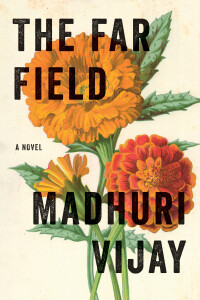
“I am thirty years old and that is nothing.” It’s a great first sentence and resonates throughout the book, taking on new shades of meaning as Shalini tells us the story of what happened when she was twenty-four.
A privileged young woman, she lives in Bangalore in southern India. Her father is a successful businessman, freeing her to lead a life without purpose: drinking and clubbing, occasionally volunteering.
Like a few of my recent reads, this novel is set in motion by the death of the protagonist’s mother. Chapters alternate between what happens next, as Shalini sets out on a journey to politically unstable Kashmir, and flashbacks to her childhood growing up with her larger-than-life mother.
Shalini’s mother never went to the U.S. like her father, and still prays to the Brahmin idols that he’s abandoned. Sarcastic, rude, and uninhibited, her mother wields her anger like a cudgel to get her own way with shopkeepers, family, and everyone else. Only Stella, their servant, remains imperturbable in the face of the tornado. Shalini calls her mother “incandescent” and “vicious.”
Then a traveling salesman comes to the door selling clothing from Kashmir. Shalini is shocked when her mother invites Bashir Ahmed in and even more so when he treats her mother’s insults and barbs with humor. A teller of magical stories that enchant both mother and daughter, he becomes a regular visitor, the only regular visitor to the house.
However, at the time of her mother’s death, they hadn’t heard from him for ten years. Floundering without her mother’s strong presence, Shalini sets out to find the charming and mysterious Bashir Ahmed.
Some people in my book club believed that Shalini hoped to discover exactly what the relationship was between Bashir and her mother, but I thought she believed that in him she would find again the comfort and certainty she’d lost when her mother died.
The writing is gorgeous, and seduced me from the start. Vijay’s descriptions and unusual images are stunning.
. . . below us was the river. I’d learned its name as a child in school, and that it was one of the five mighty rivers of the north, but I had not been prepared for such a vital, living, thing. The water was gray in places, slate blue in others, and, farther off, a tawny green. The roar was so loud it seemed to dampen the sun’s glare, so that it felt momentarily as if we were standing in shadow.
As she steps out onto the swaying bridge, at first she watches her feet but then looks up.
I could see miles and miles up and down the river, mountains looming dark on both sides, all that tall blue sky held between. It was terrifying and exhilarating, and a sound—a laugh of delight or moan of fear, I couldn’t tell—escaped me, torn away in an instant by the gale that funneled through the valley.
There is much else to like about this story. I welcomed learning more about Kashmir and Bangalore. The political divisions in Kashmir emerge organically in this story. And I’ve never before run across Bangalore as a setting in the Indian novels I’ve read.
However, I found some of the plot hard to believe. Without giving anything away, the generous assistance Shalini encounters on her journey seemed designed to advance the plot rather than how people would realistically behave, even in a culture that honors hospitality.
Several people in my book club disliked Shalini to the point where it kept them from enjoying the book. However, I found her credible. It’s not surprising that an immature, very privileged girl would be self-centered and unable to understand how to behave with the very poor people she encounters in Kashmir.
The story is a fascinating look at the clash between the wealthy urban culture of Bangalore and that of an impoverished and politically unstable village in the Kashmiri mountains.
Have you read a novel set in Kashmir?